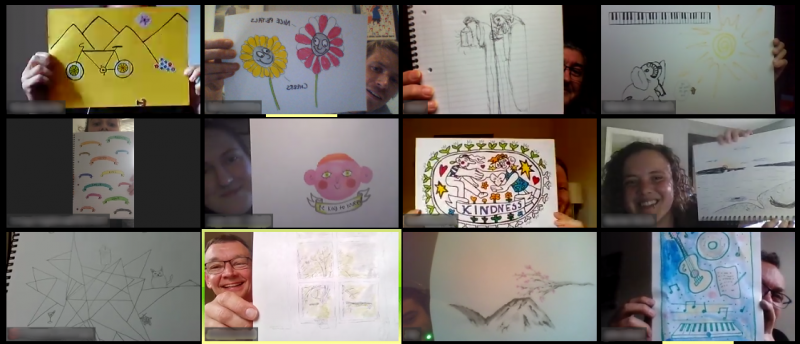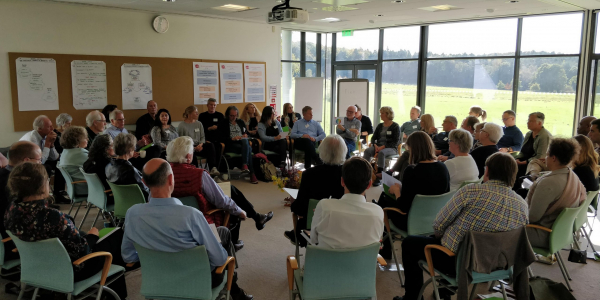Adapting Autism Service During the Covid Crisis: Lothian Outreach Service
Katie Davies, Senior Autism Practitioner
There is no doubt that Covid-19 has flipped the world of support services on its head. How we deliver support to those who need it has had to change radically and quickly. Whilst this is a stressful, terrible time for many, it has also afforded an opportunity for creativity.
Lothian Outreach services have diversified since the beginning of the Covid-19 pandemic. Whereas the standard provision of services previously comprised 1:1, face-to-face community or home support, many of our supported individuals have now seen the introduction of virtual services. For some people, virtual support runs alongside face-to-face support sessions. For others, it has replaced face-to-face support altogether.
Virtual services for our supported people vary from a text or WhatsApp conversation, to a phone call or a video chat depending on the needs and wants of the individual. What has been particularly interesting in the development of virtual support services is that despite the fairly limited methods of communication (phone, message or video call), each service seems to have developed their own ways of embracing the technology. Whilst one supported individual may simply enjoy a cup of tea and a catch up over video call or a phone call, another has been teaching their support staff how to use complex drawing programmes on their computer by sharing their screen and talking them through it. Others are watching YouTube videos together. Some are baking together, with support staff and the supported individual choosing a recipe to work on together from their own homes over video chat. Others are getting help with their college work by sharing their work over a shared screen. Some are having yoga sessions, crafting sessions or drawing sessions with their staff over video calls.
The creativity from the teams has been impressive at this time. They’ve shared resources that allow supported individuals and staff to take virtual tours of museums and zoos. They’ve shared games and apps that supported individuals can play or use with their support. And, whilst supporting the emotional needs of autistic individuals, practical support continues with staff able to prompt, for example, going for a shower after the next YouTube video or cleaning up the kitchen before baking. We are even exploring the idea of virtual social groups with the opening of our Virtual Art Club. We are still in the early stages of developing this group (and hopefully others) but we are excited to see where we go from here.
“ The supported individual decided with her team that each virtual support session will centre around one planned shared activity. This could be yoga or crafts for example. Both the supported individual and the staff member will then partake in the activity together which removes the pressure of holding a conversation for three hours. The person I support felt more comfortable with that and expressed that they enjoy the virtual support a lot more.”
Gabriele, Support Worker
Getting virtual support right for the individual (or group), has been key and not always easy. Some supported individuals have chosen not to receive virtual support at all. Others, have not enjoyed the type of virtual support that they have received. A video chat for three hours can be very daunting if there is no clear outcome or purpose for it. For some, therefore, it has been a case of trial and error and working with the individual to find creative ways to address what works for them.
“ Some have really excelled and taken the virtual support in their stride, engaging more than they would in face-to-face interactions with staff. It has the added benefit that they can tailor their support to what they want to watch or do or share. The ability to screen share has really benefited all parties involved meaning that we can do a range of activities e.g. watch each other play games, videos, music, art all while chatting to each other. One of my supported people really enjoys it and is constantly looking for new ways to engage with staff. It’s so good to have them looking out new apps to use and have them teach us!”
Amy, Support Worker
“ As the delivery methods of support sessions change and some supported individuals choose to pause their support, more and more staff are also asked to work from home at this time. This has been a steep learning curve for many as new technologies become an integral part of staff member’s working lives. One clear benefit of this change, however, is how these technologies have afforded much closer team working than ever before. As a Lothian Outreach team member, the majority (if not the entirety) of your working week involves lone working. There is no crossover of staff between shifts and you can go weeks without bumping into a colleague. With shifts occurring across the city at all sorts of times and on all days of the week, trying to find a suitable place and time for the entire team to meet for keyworker meetings or team meetings is nigh on impossible. Using the technologies that we have for video chatting and sharing documents and files has allowed the team to pull together and have regular contact with one another. Whilst we may have had access to these technologies and programmes pre-Covid-19, we had never used them to their full potential – in ways we may never have learned had it not been for necessity at this time. I have found the transition from working out in the community every day to working from home quite challenging as I am so used to being out and about with the individuals I support. However, there have been many positives to take from this experience that I hope we can carry forward in the future. For example, it has been great to have scheduled meetings every week via Microsoft Teams and talk to my colleagues about the services we work in and have the chance to discuss ways to make changes/improve these services during these difficult times but also when normality resumes. Working in outreach can make it difficult to catch up with everyone in your team so this has been great!”
Katie, Support Worker
There is no doubt that this has been, and continues to be, a difficult time period for supported individuals and staff, full of uncertainty and transitions. But I for one, am excited to see how our services will develop as a direct result of this period of time. There is no doubt in my mind that virtual support will continue to be a useful tool both for collaborative team working, but perhaps more excitingly, for supporting individuals.
For a supported person’s perspective on the shift to virtual support, see Alexander Edwards’ contribution to this edition of Share.





